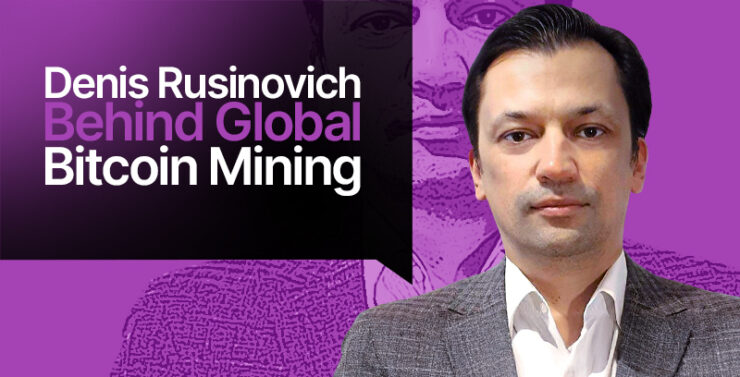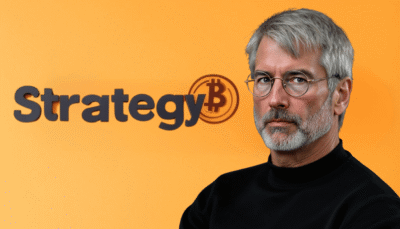Denis Rusinovich is not your average Bitcoin miner. He doesn’t just plug in machines and hope for the best. With over two decades of experience in international finance, commodities, and private equity—including 12 years at the European Bank for Reconstruction and Development (EBRD)—Denis brings a geopolitical, energy-market, and regulatory lens to crypto mining that few in the space can rival.
Since entering the Bitcoin mining industry in 2017, Denis has emerged as a go-to expert for navigating the global chessboard of energy infrastructure, policy regimes, and capital deployment. Today, he leads CMG (Cryptocurrency Mining Group), a research and advisory firm deeply involved in aligning BTC mining with traditional industries like waste management, utilities, and high-performance computing (HPC).
But his journey into crypto was anything but conventional.
“It took me some time to be convinced that it’s not some Ponzi scheme because I’m like everyone else at the time was reading FT Economist… I was like, okay, it’s a digital gold, whatever they call it, but OTC market. And this is how I basically tried to, for myself initially, I was trying to relate to this sector. And this is how the journey began.”
From Global Finance to MegaWatts of Bitcoin
Denis began his career in structured finance at the EBRD, working on cross-border industrial projects throughout Europe and Africa. He later transitioned into metals and mining—dealing with gold, copper, and rare earth elements—and eventually moved into private equity, where he helped scale QSR chains and logistics companies.
So why Bitcoin?
In 2017, a group of investors invited Denis to help scale a mining pilot in Kazakhstan. What began as a one-megawatt project grew to over 150 megawatts under his strategic direction. Leveraging his banking background, Denis pushed to formalize regulatory dialogue with the Kazakh government, ultimately helping shape one of the region’s first mining-friendly legal frameworks.
“We can’t build a capital market story without actually trying to engage in a policy dialogue with the government because every second week we have news coming out where the central bank or someone else says, it should be shut down.”
Mining as Infrastructure, Not Just Profit
Denis doesn’t view Bitcoin mining as a speculative tech hustle. He sees it as industrial infrastructure. On The CoinRock Show, he described mining operations as decentralized data centers, stressing their capacity to absorb stranded energy and generate local employment in remote regions.
“With Bitcoin mining, it’s much more simple. They can cut the corners on some optimization, but what’s vital and what is there is the telecom and the energy supply”
This view has shaped Denis’ advisory work at CMG. Rather than chasing fleeting hardware cycles, Denis encourages mining outfits to build long-term viability through convergence—with AI, with data centers, and even with district heating systems in colder climates. His thesis is simple: Bitcoin mining should be embedded in a country’s broader energy and economic strategy.
The Geopolitics of Hashrate
What sets Denis apart is his understanding of Bitcoin mining as a geopolitical lever. On the show, he warned that energy competition could invite regulatory crackdowns unless miners work within government frameworks. He also highlighted how infrastructure investments—not just BTC holdings—can shape global influence.
“If we look at the actual fundamentals, I mean, it is not about democracy, it’s about control of resources. And this is where the interest of Russia, China, Europe, US, you know, is all trying to coexist and compete there,” he said.
“This is vital for the government for the future of their people, you know, regardless if the Chinese, the Russians or Americans, whoever finance it, at the end of the day, we’re going to have an energy infrastructure inside the country. And this is an interesting block.”
From Ethiopia’s hydro-driven regions to Russia’s underutilized Arctic grids, Denis has a front-row seat to how hashpower is migrating—not just due to electricity prices, but also geopolitics. And he doesn’t shy away from the implications.
“You know, some of the regions, they said, guys, you know, you’re not supposed to have a mining in the first place here or you are stealing energy. You’re using the domestic energy, which is supposed to be for residentials”
What makes Denis Rusinovich unique isn’t just that he mines Bitcoin. It’s how he thinks about it. For him, every megawatt plugged in is part of a bigger story—one involving sovereign energy policy, institutional capital flows, and even national security.
He has seen mining evolve from warehouse scrappiness to industrial-grade discipline. And as cycles continue, he believes the sector must become smarter, more embedded, and more accountable.
“You’re definitely going to have more professional players who actually do the sector convergence using the flare gas or basically using oil and gas sector, energy utilities, for example, waste management”
In an industry still full of short-term opportunists, Denis is a rare example of long-term strategy meeting deep technical grounding. Whether you’re bullish on Bitcoin or not, Denis Rusinovich is one of the people in crypto who understands where the puck is going—and how to build the road to get there.
Where You Can Find Denis Rusinovich
- X : @DenisRusinovich
- LinkedIn: Denis Rusinovich
- Clay Profile: Denis Rusinovich on Clay
- CMG Cryptocurrency Mining Group: @BTCMiningGroup





